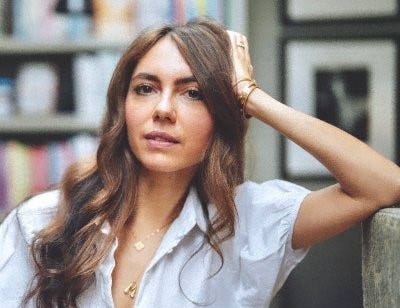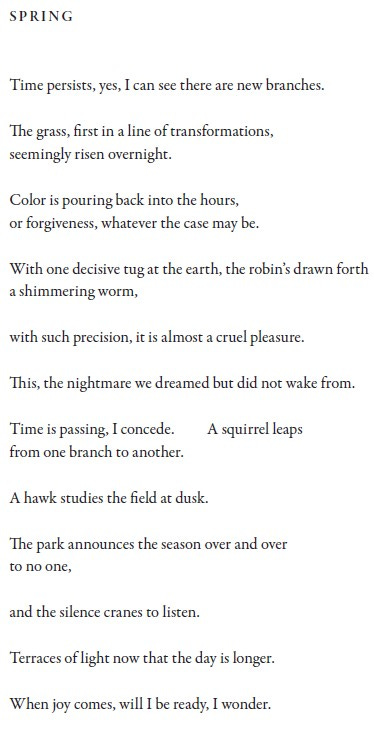Terrified of poetry? Why yes, I am.
My experience with poetry and a review of Maya Popa's new collection
Welcome to Beyond the Bookshelf, a community of readers and writers sharing unique perspectives on life and literature through thought-provoking essays, captivating interviews, and influential books as we explore the challenges of life's transformative journey.
Dear Reader,
During the first week of April, I saw a note from
asking if any writers would be interested in a copy of her new volume of poetry. I told her I would love to read and review it for my community. She promptly emailed me, and I downloaded the book to my desktop before staring at it with fear and trembling. You see, what I didn’t tell Maya was that I am terrified of poetry.I read nearly anything, yet very few written works make me question my reading ability like poetry does. I fear it because I am not quite sure I understand it. When confronted by symbolism and ambiguity, which attempt to wrestle meaning from my emotions, my logical nature gets thrown into chaos.
As I take a deep breath and ask myself why I reached out to Maya if I am so afraid, I realize I am a lifelong learner with a growth mindset. I have faced my fears before, serving on submarines and deploying to the desert. This fear of poetry is just another challenge for me to overcome. I am curious to delve into the intriguing world of verse and see what happens.
What I find truly fascinating about poetry is its profound historical significance, an ode to our shared humanity. The term 'poetry' originates from the Greek poiesis, which means 'to create' or 'making.' In its earliest forms, poetry was not merely a mode of expression but a vital thread in the fabric of human history. It likely began as an oral tradition predating written languages, used to transmit knowledge from one generation to the next. The repetitive and rhythmic nature of early poetic forms would have facilitated the memorization of vast amounts of information, a testament to human ingenuity. Poets were the architects of civilization, a living link to our collective past.
The Epic of Gilgamesh, written in cuneiform, is often thought to be the earliest example of poetry in writing. Others from antiquity include Homer’s Iliad and Odyssey, written in ancient Greek, and the Ramayana and Mahabharata, written in Sanskrit. What is fascinating is that poetry appears to have developed independently across broad geographic regions and cultures, from the panegyric and elegiac court poetry of Africa to the oldest Chinese collection, aptly named Classics of Poetry. While Beowulf is perhaps the best-known poem in Old English, modern English poetry became prominent in the early 20th century.
Poetry uses various forms, conventions, figures of speech, and stylistic elements to create a work that is frequently open to interpretations. Modern poetry is seldom used to transmit factual information but instead finds its value in evoking emotional responses. Modernism, which emphasizes the creative role of the poet, also saw the rejection of traditional structures and the rise of free-verse. Postmodernism, on the other hand, considers the reader's role in interpreting the text.
This brief overview of poetry’s history and structure cannot do justice to its literary importance, but perhaps it will stimulate your interest sufficiently to dig deeper into the topic.
“every bright thing has at its heart a hiddenness
it offers when you’ve just about stopped looking”
- All That Is Made by Maya Popa
Wound is the Origin of Wonder by Maya C. Popa, a stunning collection published in 2023 by W.W. Norton and Company, bears witness to the beauty of poetry. Despite my initial fears, I was captivated by this work once I dared to open it. Maya holds a PhD focusing on wonder in poetry, so she is immensely qualified to write on this topic. At first, I was unsure if I understood what I was reading, but then it dawned on me that I didn’t need to understand immediately to be moved by it. I read aloud to myself repeatedly, allowing the words to wash over me like spring rain, which soon became an engulfing torrent, a raging river of power and emotion.
Written in three triptychs, the poems in this volume explore existence in the in-between space, a world and time in constant flux between life and death. Throughout the work, the dominant theme is wonder—wonder in individual life, the natural world, and time and space. But pain and grief are also there, and the reader walks a delicate tightrope between beauty and torment.
Here are my three favorites from the collection.
As you can see, Maya is a gifted poet, a bright and needed voice in our midst. She is also a giving teacher with a publication and platform offering classes on writing poetry which you can find at
. Earlier this month she was featured on Elizabeth Gilbert’s Letter from Love and I recommend giving that article a read as well. If you enjoy poetry or want to learn more about this literary form, I encourage you to visit Maya’s publication. You can purchase a copy of Wound is the Origin of Wonder by visiting Maya’s website.As the ebb
and flow
of war
and peace
rip
at the foundations of so much
we had built our worldviews upon,
it feels ever more important to sit quietly
on the ground of our own awareness,
understand where our weary world is
at this moment, envision how we know it could be,
and walk the walk in the direction of the rising sun.
A new day is coming. With each mindful step
we must greet it
with love and kindness
courage and compassion.Do you have a favorite poet? Share with us in the comments.
Until next time…
Writing Beyond the Bookshelf is a labor of love and will continue to be free for all readers for the foreseeable future. If you want to support my writing financially and have the means, a couple of options are available. Buy Me a Coffee is a one-time “tip” as a way to say thank you. Subscribing at one of the paid tiers is for those who wish to provide ongoing support. Regardless of how you support my work, as a free subscriber or paid, I am grateful that you have chosen to be an integral part of this community of readers and writers exploring the intricate relationships between life and literature.










I am floored by this beautiful, thoughtful, generous review and loved reading all of your personal reflections AND the useful historical context. Thank you, thank you. 🫶🏼
I think one of the great beauties of poetry is that no matter what we believe about it (and ourselves in relation to it), it’s really only asking us to bear witness to it. For a long time, I forgot that poetry is less about what it meant to (or about) the author when it was written, than it is about what it brings up in and the meaning it takes on for the reader.
Thanks for sharing this review with us!